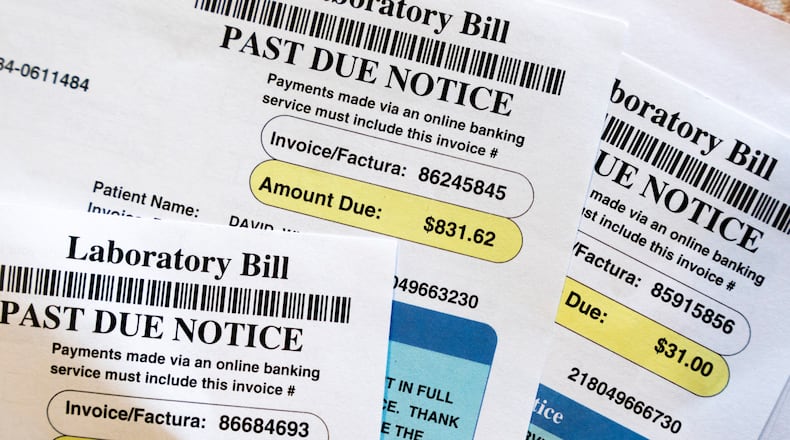In Clark County, more than 5,200 residents owe $9.1 million in such debt. Now, however, community leaders and organizations have launched the Clark County Medical Debt Relief Campaign to help these citizens.
“We want to see people relieved of debt that’s a burden so we can help them have a better life,” said Kristy Kohl McCready, president of the Mercy Health Foundation for Clark and Champaign counties. “We’re trying to get people out of poverty so they have a chance to have homes, to have a car so they can get back and forth to work.”
The campaign has partnered with regional think tank The Collaboratory, which in turn has teamed with the national nonprofit Undue Medical Debt as part of The Collaboratory’s Community of Well-Being Initiative.
It’s an effort to wipe out more than $22.7 million in medical debt in the Dayton and Springfield region for a fraction of the cost of the accumulated debt. Of that $22.7 million, 40% is held by Montgomery County residents and 40% by those in Clark County — a lopsided equation considering the population difference.
People cannot apply to have their medical debt erased as part of this campaign. Here’s how it works:
- Unpaid medical debt is sold to third-party collectors, who contact debtors in attempts to obtain payments, which would go to collectors, not the initial health care provider. (Debts that remain unpaid eventually are sent to credit reporting agencies.)
- Undue Medical Debt has negotiated a highly reduced rate with third-party collectors for medical debts, which are the most likely to remain unpaid. For every dollar raised through this campaign, collectors are writing off $178.
- Undue Medical Debt then can target a certain area — Clark County, in this case. The organization focuses on those who earn at or below four times the federal poverty rate and those with medical debt that accounts for 5% or more of their annual income.
- As the Clark County Medical Debt Relief Campaign raises money, The Collaboratory then works with Undue Medical Debt to pay off medical debt.
- Those receiving assistance will receive an official letter on Undue Medical Debt’s letterhead to let them know — oh, happy surprise! — their medical debt has been forgiven.
If the Clark County campaign raises $51,000, then the entire $9.1 million in county residents’ current medical debt will be wiped out.
“It’s the most incredible (return on investment) I’ve ever seen,” said McCready, who’s meeting with community leaders to build support for the campaign.
Fundraising efforts, which will run through at least the end of August, are focused on raising $10,000 to secure a matching grant from The Turner Foundation. In addition, Mercy Health associates contributed $5,000 in June through the organization’s employee giving program.
Learn more about the complex issues surrounding medical debt and donate on The Collaboratory’s website at daytoncollaboratory.org/medicaldebt.
The campaign is just one piece of addressing the larger, systemic issue of medical debt and the United States’ health care finance system, proponents of the campaign say.
Ben Merick, vice president of market operations for the Springfield market, is spearheading the Clark County campaign. He said Mercy Health undertook a similar effort in the Toledo market a year or two ago and found “it was a great engagement for the community to start having more dialogue” about this issue.
The faith-based organization also works with state legislators on advocacy around medical debt and its impacts. Ohio House Bill 257, introduced by Ohio Representatives Michele Grim (D-Toledo) and Jean Schmidt (R - Loveland), is currently in a house committee. The bill would cap the interest rate on medical debt at 3%, prohibit medical debt from being reported to credit agencies and prevent employers from garnishing wages for medical debt repayment.
Dobyns knows all too well how medical debt can affect more than a person’s health. For example, one of his employers garnished his wages — which eventually led him to being terminated, Dobyns said, adding he wasn’t hired for other jobs because of his low credit score.
“Overall, it’s affected my ability to have a decent quality of life or a good vehicle,” he said. “I live with my mom because I don’t have excess funds to have an apartment. It’s been difficult to advance socially in like different areas, and it affected my mental health, so I’d just stay inside, and it got to the point where I gained a bunch of weight.”
Merick said the Clark County campaign is all about doing the right thing for people like Dobyns, with no financial gain for the health care organization.
“As a Catholic ministry, we take our clues how to treat human beings from that lens,” Merick said. “We see poor, sick, dying and underserved people every day, and if we can play a small role in helping them, we owe it to them to do so.”
About the Author

